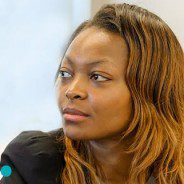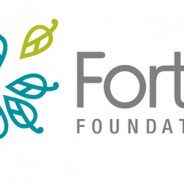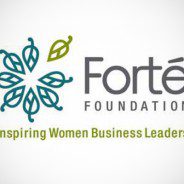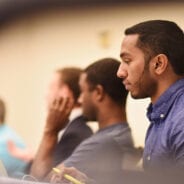Search results for forte:
New Forté Data Shows Impressive Gains in Female MBA Enrollment
This post has been republished in its entirety from original source clearadmit.com.
Women make up at least 40 percent of the MBA class at 12 leading U.S. business schools this year, compared to just five last year, according to new data released today by the Forté Foundation, a nonprofit consortium of business schools and companies working to increase opportunities for women in business.
“In 2011, less than a third of MBA students were women. Today we’re inching closer to 40 percent in the United States and working to close the gap significantly in another five years,” says Forté Executive Director Elissa Sangster. “Every percentage point gain is not only hard earned, but something to celebrate, and should go a long way in building the senior leadership pipeline at companies and on boards,” she continues. Continue reading…
Forté MBALaunch Program Prepares Strong Female MBA Applicants to Excel
This post has been republished in its entirety from original source clearadmit.com.
This comprehensive 10-month program, created by the Forté Foundation, guides promising female MBA applicants through each step of the application process, providing both a proven road map and an unparalleled support network to help you gain admission to your top school.
Applications are currently being accepted for women seeking to apply to MBA programs in fall 2016 (for enrollment in fall 2017). The deadline to submit is November 15th. To be considered for MBALaunch, you must have a bachelor’s degree and demonstrate solid academic standing. Post-undergrad work experience—between two and seven years—is also preferred. Continue reading…
New Forté “Rising Star” Pilot Program Preps Undergrad Women for Business
This post has been republished in its entirety from original source clearadmit.com.
Undergraduate women on 10 U.S. campuses can now participate in a fun, free online program designed to help them prepare and compete for top jobs in business-related fields. The new “Rising Star” pilot initiative, announced yesterday by the Forté Foundation, is designed to encourage young women of all majors to start exploring career options early to better position them for jobs in business fields immediately upon graduation. By extension, the new program could also help position women to apply to competitive MBA programs after acquiring requisite work experience.
Schools participating in the “Rising Star” program include Carnegie Mellon University, Cornell University, George Washington University, Indiana University, New York University, Ohio State University, the University of Michigan, the University of Texas at Austin, William & Mary and Yale University. Forté handpicked the participating schools, most of which are in the consortium’s business school membership already, with the goal of including a diversity of schools ranging from large public institutions to small private colleges. “We went to familiar campuses where we have a strong support network for this pilot year, with the intention of expanding as soon as the pilot year is over,” says Forté Executive Director Elissa Sangster. Continue reading…
Forté Forums Scheduled in 12 Cities Beginning August 17th
This post has been republished in its entirety from original source clearadmit.com.
August is upon us, which means that it’s almost time for the Forté Forums. These free events are hosted by the Forté Foundation, a nonprofit consortium of leading companies and top business schools committed to advancing the role of women in business. Held in 10 U.S. cities and well as Toronto and London beginning on August 17th, they are designed to help women learn more about the value of the MBA.
Whether you are a college student looking to explore options for the future, have been in your job for a few years and are thinking about a change or are looking for a way to catapult yourself to the next level in your career, the Forté Forums are for you. Continue reading…
Women Leaders of the Smith School Speak at Forté MBA Women’s Leadership Conference
On June 20, two expert businesswomen from the Robert H. Smith School of Business, Elana Fine and Vice Dean Joyce E.A. Russell, discussed the importance of speaking up and asking for more at the Forté MBA Women’s Leadership Conference in Washington, D.C.
Fine moderated a keynote panel on empowering women entrepreneurs. Continue reading…
Forté Foundation Women’s Leadership Conference Draws Record Attendance
This post has been republished in its entirety from original source clearadmit.com.
Current female MBA students and alumni came out in droves this year for the 2015 Forté Foundation MBA Women’s Leadership Conference, which took this past week at Georgetown University’s McDonough School of Business. Kicking off with a sponsors meeting on Thursday for school and company representatives, followed by a career-focused day of programming on Friday and a day centered around professional development Saturday, the conference this year has welcomed 459 MBA women and alumni, in addition to more than 100 speakers and presenters. For those who don’t know Forté, it is a nonprofit consortium of leading companies and top business schools devoted to launching women into successful business careers.
“I think we have pulled together some really interesting topics that a lot people want to hear about,” says Elissa Sangster, Forté Foundation executive director, when asked what contributed to this year’s record attendance. “We are excited to see it all come together.” Continue reading…
REGISTER: The Forté Forum at UIC Liautaud
UIC’s Liautaud Graduate School of Business is sponsoring the Forté Forum in Chicago on September 8, 2014. This forum/information session is designed for women to learn about the power one can gain from attaining an MBA degree. The event will be held at the Booth Gleacher Center from 6:00PM to 9:00PM. Continue reading…
Smith Named Member of Forte Foundation
The Robert H. Smith School of Business was one of only six institutions named as 2014 sponsor of the Forté Foundation, a consortium of major corporations, business schools and non-profit organizations that champions women for leadership roles in business. This is the first year Forté has invited U.S. business schools to apply as sponsors since 2011, with Smith bringing the total number of member the U.S., Canada and Europe to 48. Continue reading…
The Forté Women’s MBA Conference Returns to Anderson
The Forté Women’s MBA Conference returned to the UCLA Anderson campus on Friday June 20, 2014. The conference is put on by the Forté Foundation, a nonprofit consortium of leading companies and top business schools working together to launch women into careers through access to business education, opportunities and a network of their peers.
2013 Forté Forum Comes to Boston
The Forté Foundation is hosting Boston’s Forté Forum, an event geared toward women interested in pursuing an MBA, on Tuesday, August 20 from 6-9pm at the Sheraton Boston Hotel. The goal of this interactive event is to help women determine whether or not an MBA will help them fulfill their professional aspirations, and provide an opportunity for various business schools to interact with potential applicants.
Onsite registration will begin at 6pm, as will the School Fair. Running the full length of the event, the School Fair will comprise of admissions members from top U.S. and international business schools, with a special emphasis on local schools. Babson College’s F.W. Olin Graduate School of Business, MIT Sloan School of Management, Simmons School of Management, Boston University’s School of Management, and Boston College’s Carroll School of Management are just some of the local business schools that will be represented at the Forté Forum, in addition to other nationally- and internationally-renowned schools (for the full list of participating MBA programs, please refer to Boston Forté Forum’s web page).
For those interested in speaking individually with MBA graduates about their professional experiences, a networking reception with light refreshments will be held from 6-7pm.
From 7-8pm is the MBA Alumnae Panel, which will feature MBA women in various industries and career stages, and will cover a wide range of topics; such topics include how they chose their career, what motivated them to pursue an MBA, and the various successes and obstacles they’ve faced.
At 8:15pm, an Admissions Panel made up of seasoned MBA admissions professionals will discuss admissions requirements, researching schools, the application process, and how to finance an MBA.
Online registration has ended, so those wishing to attend will be prompted to register at the door and pay an entrance fee of $5. Attendees are encouraged but not required to stay for the full duration of the event, and may come and go as necessary. Those seeking more information should email forte@fortefoundation.org.

Connect with the Simmons School of Management at the Boston Forté Forum
The Forté Foundation has invited Simmons School of Management to participate in several of their Forté Forum events, including one in Boston on Tuesday, August 20. The Forum is specifically geared toward women seeking MBAs.
Founded in 2001 to address why fewer women attend MBA programs in comparison to graduate programs in medicine or law, the Forté Foundation encourages women to pursue degrees in business to help them achieve successful, fulfilling careers. The Forté Foundation’s primary obstacle to helping women realize their professional potential are the misperceptions many women have about careers in business, namely that they are inflexible and require a highly specialized set of skills. Consequently, the Forté Foundation endeavors to provide women with the information and resources they need to make informed decisions regarding a career in business.
The Foundation’s partnership with Simmons School of Management seems natural given the latter’s commitment to producing female leaders; Simmons offers an MBA program designed to help women develop their business and managerial skills, fully cognizant of the unique gender dynamics women may face in their professions. In addition, Simmons sponsors leadership development programs with the goal of advancing women in business, holds an annual women’s leadership conference, and fosters progressive research on issues related to women, leadership and management.
Reaching beyond the scope of a typical information session, the Forté Forum event will include guidance from women with MBAs in various industries and stages of their careers, as well as opportunities to interact with Simmons admissions staff. The Forum will also shed light on how an MBA can lead to success in any number of industries, and facilitate conversation among those interested in pursuing their MBA.
The August 20 event in Boston will be held at the Sheraton Boston Hotel on 39 Dalton Street, from 6-9pm. Simmons representatives will travel to a number of additional Forté Forum locations this summer and fall, including New York City, which will host a two-day event on September 3 and 4.
The Forté Foundation encourages woman of all ages and professional experience to attend, welcoming college students and MBA candidates alike. For those who pre-register, the cost to attend a Forté Forum is free; there is a $5 fee for those who opt to register at the event. Those interested can register online with the Forté Foundation.

Dynamic Diversity at Imperial College Business School – Opportunities for Female Students are Changing the MBA Landscape
As the deadline draws near for the upcoming Full-Time MBA class to apply, Imperial College Business School hopefuls may be weighing their funding options. Female students in particular are making up more and more of the demographic seeking an MBA. In fact, this past Full-Time cohort at London’s Imperial College Business School saw 43% of its class identify as female. They’re hoping to raise that number to 50% and to do so, they’ve got resources.

Olivia Xu, Forté Fellow
A Forté Foundation partner, Imperial College hosts the Imperial MBA Women group to create a support system and foster networking opportunities for current and graduated female students. The group holds virtual meetings and utilizes a WhatsApp chat to continue open communication during the current pandemic. The school offers a wide array of scholarships including Forté Fellowships worth more than £27,000.
MetroMBA spoke with Olivia Xu, a current Forté Fellow and Full-Time MBA student at Imperial College Business School. ‘Being a Forté Fellow has not only provided me financial help during the MBA, but also a vast network of other businesswomen who are or have gone through the same journey that I am. It was through Forté that I was able to meet other women across the globe who have similar interests and be able to network and connect with them’ stated Olivia. An international student from the US, Olivia said she was attracted to Imperial because her goal was to attend, ‘a school with a strong track record of keeping the environment at the forefront. Her program focus is on sustainability and responsibility and she hopes to work at a fashion start-up that is striving to reduce fast-fashion waste after graduation. With the recently initiated Sustainable Imperial Strategy designed to transform the school into a carbon net-zero institution by 2040, it’s no surprise students are opting to attend Imperial College Business School to further their careers while making a global environmental impact.

Morgan Mixon, Forté Fellow
Olivia isn’t the only student seeking to make this impact and achieve her MBA from abroad. The diverse and inclusive student demographic (currently consisting of students from 23 countries) entices MBA candidates from all over the world. Morgan Mixon is also a Forté Fellow and Full-Time MBA student at Imperial College Business School. She said that her fellowship plugged her into an ‘international network of women who are thinking about, pursuing or graduates of MBA programmes’. Morgan is currently specializing in innovation and entrepreneurship. She chose Imperial because it’s a top STEM university with, ‘a business school whose leaders and students also are passionate about driving bold change in the world’. She is the co-founder of Cleanest, striving to reduce the diaper industry’s environmental footprint and create healthier, more sustainable wear for infants.
The success of these MBA candidates should come as no surprise. Imperial College Business School’s Full-Time MBA program is one of the first to receive a department-level Bronze Athena SWAN award from the Equality Challenge Unit(ECU) in recognition of its commitment to tackling gender inequality in higher education. For female students looking to apply to the program, they should know they’re in good company.
Students seeking to apply are encouraged to utilize the scholarship resources offered by the school and complete applications prior to the upcoming June 18th deadline to attend this coming fall.
Be Who You Are
Sponsored Content
Why Rice Business Prizes Diversity – Be Who You Are
Here in the heart of America’s most diverse city, the Jones Graduate School of Business at Rice University seeks, values and champions students from a range of backgrounds. The reasons are simple, says Lina Bell, our Director of Diversity and Inclusion. “Research shows that the best business decisions are informed by a multitude of perspectives,” Bell says. “In addition to being good for business, it’s the right thing to do.”
High-achieving people of color, of LGBTQ orientation, of foreign birth and women still face discrimination – which means that picking the right business school means choosing a culture as well as a classroom. They may also face specific challenges, such as financing graduate school without intergenerational wealth or finding an environment where they’re seen as individuals rather than as representatives of a community. This second point is important, since some members of underrepresented minorities say they feel less free to make a mistake or spontaneous comment when they’re seen as spokespeople for their group. At Rice Business, we strive to appreciate each student on their own terms.
This philosophy is integral to Rice Business culture, Dean Peter Rodriguez says. “Organizations and societies truly succeed only when everyone within them is equally valued and supported for who they are,” Rodriguez, an economist, says. “To fully live our values at Rice Business, we have to first commit to ensuring that every one of us can confidently bring their whole, pure self here every day.”
Rice Business Benefits From A Diverse City
Students at Rice Business, while learning in purposely small classes, also benefit from the school’s location in Houston. The fourth largest city in the country, it’s distinguished both by extraordinary diversity – it has the most equal distribution of ethnic groups in any U.S. metropolis – and a pragmatic, business-friendly culture.
Known as a welcoming and progressive city, Houston is the nation’s number one refugee destination, the first major American city to elect an openly gay mayor – twice – and is currently governed by a two-term African American mayor.
On our serene campus near the world’s largest medical center, Rice Business prioritizes diversity and top business skills – and recognizes that the two reinforce each other.
Diversity And Good Business Reinforce Each Other
Research by Rice Business professors confirms the value of these priorities, showing, for example, the power of antidiscrimination law and how innovation can spring from economic constraint, adversity and even living in another country.
This respect for a range of life experiences is what sold MBA student Norma Torres Mendoza on Rice Business. “I knew they were serious about their diversity efforts when I received a called from Dean Rodriguez congratulating me on my acceptance and on my Paul and Daisy Soros Fellowship,” says Mendoza, a member of the Class of 2020. “I knew that my presence mattered to Rice so much that the dean was willing to call. I believed that my voice as a former undocumented immigrant and first generation college graduate Latina mattered, and it mattered enough to add a scholarship behind it.”
Ashley John, an African-American MBA student in the Class of 2020, says the school’s commitment to these values was clear from the moment she applied. Born in Missouri City, Texas, John studied urban affairs at Stanford University before working for five years in nonprofit educational administration. “I was looking for a program with a strong community that was interested in social impact,” she says.
From the start, says John, Rice admissions staffers were thoughtful and candid in helping her prepare for both the quantitative and qualitative parts of her application. They were also hands-on in advising her on financial issues.
Exceptional Scholarship Opportunities
“I think sometimes we don’t like to talk about money, but it’s a really big investment to go back to school,” John says. “Rice had by far the best scholarship packages.”
That receptiveness is echoed by her classmates, and amplified by the inaugural class of the Consortium Fellows Program, which is dedicated to increasing the number of underrepresented minorities in business education and corporate leadership. After Ashley got knee surgery that kept her from driving, members of the Consortium’s Rice Business chapter surprised her with an Uber gift card.
While inclusiveness makes for a happy academic experience, it’s also basic training for modern global business, says Utpal Dholakia, a Rice Business marketing professor.
“It really shows the power of cultural literacy,” he notes. “Business schools need diverse students of all backgrounds. At some point they’re going to be educating each other.”
Rice Business also teaches – and practices – inclusiveness toward gender and sexual orientation. Research by Rice Business professor Mikki Hebl shows that, contrary to cliché, you really can legislate fairness. In a study of antidiscrimination laws protecting LGBTQ workers, Hebl found that such laws both communicate fairness as a social norm and influence behavior with the threat of enforcement.
Promoting Women Leaders: High Priority
Promoting women as leaders is a high priority at Rice Business. At the institutional level, Rice Business is one of just 50 schools selected to partner with the Forte Foundation, a national organization that supports women MBAs with scholarships and training. In 2018, the Financial Times ranked the Rice MBA as the top school in Texas for women.
Stacy Fish, a full-time 2020 MBA student, found the same type of support on campus. “I think if I were at a bigger school I would have felt a little drowned out,” Fish says. Instead, in her very first weeks at school, peers and professors pushed her to take an active role on the committee planning the annual Women In Leadership conference. The experience was so powerful that Fish ran for president of the Rice Business Women’s Association – and won.
Be Who You Are And Who You Want To Be
In tandem with school culture and the global character of Houston, affinity clubs are key to creating a sense of belonging, diversity director Bell says. In addition to the Women’s Association, the options include the Asian Business Student Association, Black Business Student Association, Hispanic Business Student Association, Veterans In Business Association and Out And Allied. Every year, the school’s Diversity and Inclusion Conference gathers hundreds of students, alumni, faculty and corporate participants to discuss the business case for a richly varied work community. All these activities, Bell says, are aimed at one goal: making each Rice Business student feel welcome and free to experiment and learn.
“If you’re looking for an MBA program where you’re going to be taken care of and going to be taken seriously – where you can be who you are and who you hope to become,” Bell says, “the Rice MBA program will be for you.”
Contact:
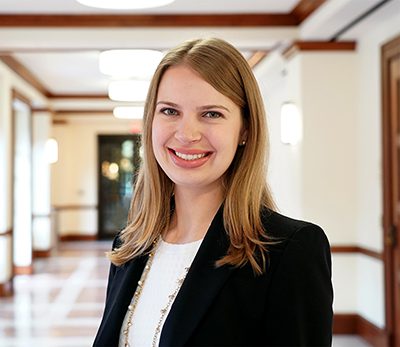
Name: Kalyn Speck
Title: Assistant Director of Recruiting, Recruiting and Admissions
Email: kms15@rice.edu
Phone: 713.348.3732
The Online MBA: Which Programs Matter?
Have you ever wondered what it would be like to earn your MBA online? We wanted to take an in-depth look at the advantages of an Online MBA program and what it looks like to complete your graduate business education online—how long it will take, what activities will be available to you, and how it will enhance your career.
To that effect, we interviewed the admissions staff at some of the top brick and mortar business schools with leading Online MBA programs: CMU Tepper, Indiana Kelley, Michigan Ross, UNC Kenan-Flagler, and USC Marshall. Here’s what we learned:
CMU Tepper School of Business Online MBA

The CMU Tepper School of Business Online MBA program is a hybrid program, meaning students attend live, interactive online classes two evenings a week (for 70 minutes each) and then work the rest of the time offline, at their own pace. Students take the same rigorous curriculum as full-time students and are taught by the same faculty and staff.
- Duration: Flexible program duration
- Travel: Six times a year, students meet in-person for Access Weekends in Pittsburgh, Silicon Valley, Philadelphia, and Washington, D.C.
- Workload: You’ll attend two, 70-minute live class sessions every week with an additional 3-5 hours of offline assignments.
CA: How do your Online MBA students take advantage of extracurricular activities (e.g., can they join a finance club, organize a tech conference, what are the similarities for an online program with the full-time program)?
 “The Tepper School part-time Online Hybrid MBA is structured to provide maximum flexibility without sacrificing the extra-curricular experience, which is an essential component of an MBA program. Our online students have access to various campus activities, including student clubs, speaker events, and career treks that enrich the academic experience and provide opportunities to connect with colleagues, alumni, and potential employers. We also have a TepperBot (picture attached), which is a great way for students to actively join campus activities remotely. They can control the TepperBot’s movements from their phones, adjust the height, roll through spaces. It’s an excellent way for online students to be part of the on-campus experience.
“The Tepper School part-time Online Hybrid MBA is structured to provide maximum flexibility without sacrificing the extra-curricular experience, which is an essential component of an MBA program. Our online students have access to various campus activities, including student clubs, speaker events, and career treks that enrich the academic experience and provide opportunities to connect with colleagues, alumni, and potential employers. We also have a TepperBot (picture attached), which is a great way for students to actively join campus activities remotely. They can control the TepperBot’s movements from their phones, adjust the height, roll through spaces. It’s an excellent way for online students to be part of the on-campus experience.
Throughout their Tepper experience, online MBA students actively participate in student club activities; leadership coaching and workshops; corporate presentations and recruiting; and all that business school has to offer. Our online students have an active student leadership organization, and even started a virtual Friday afternoon happy hour!
CA: How do your Online MBA students take advantage of career resources. Do you offer the full-time MBA equivalent of on-campus recruiting?
“Our part-time Online Hybrid MBAs have access to the same career resources as our full-time students, including on-campus recruiting, corporate presentations, career treks to visit employers around the country, and connections to jobs at premier companies. Our top-ranked Masters Career Center provides career coaching from seasoned professionals to help them successfully manage career opportunities.”
IU Kelley School of Business Online MBA

The IU Kelley Direct Online MBA is delivered completely online. Students must complete 54 units to graduate—27 credits of core courses and 27 credits of electives. Courses are taught by the same faculty that teach the full-time MBA, but students have the flexibility to fit the coursework into their busy schedule. You can either participate in live lectures with your classmates or watch recorded lectures on your own schedule.
- Duration: Two to four years
- Travel: Students attend two Kelley Connect Weeks, which are intensive seven-day, in-person experiences on IU’s Bloomington campus.
- Workload: Live weekly classes are around 75 minutes in length in addition to prep work and additional study.
CA: How do your Online MBA students take advantage of co-curricular activities (e.g., can they join a finance club, organize a tech conference, what are the similarities for an online program with the full-time program)?
“Effective November 1, we have re-branded student services to the Office of Student Services and Advising. That unit is now responsible for co-curricular and experiential activities. What is true about an online MBA student is that they want to build a set of experiences that complement what they do in the classroom, but there is a lot of variability in terms of what they want to build.
Our co-curricular experiences have been divided into various buckets.
- There are four-credit experiential learning opportunities. Specifically, there are global learning courses that offer two types of experiential learning. There is a consulting course where they work on a live project, and then there’s an exploratory course where students spend a few weeks in a different country working with and learning from high-performing corporations outside the U.S.
- We also offer a robust suite of affinity groups—both identity-oriented groups and functional groups. As an example, there are several events for online MBA students, including virtual happy hours and excursions to visit Warren Buffet in Nebraska.
- Third, twice a year, we have a Global Connect Night where students get together and have refreshments with each other all across the world. Students entirely coordinate these events.
- Finally, we have a high-impact suite of offerings from our Career Management Center and one-on-one career coaching.”
CA: How do your Online MBA students take advantage of career resources. Do you offer the full-time MBA equivalent of on-campus recruiting?
“We have a five-phase career development model for our online MBA students that begins before a student’s very first Kelley Connect Week. They are sent access to a website that allows them to begin pre-work on their career goals and what they’re hoping to get out of their online MBA.
We recognize that most students in our program are primarily seekers looking to change their function, industry, or location, or they are career navigators looking to move up in their organization. So, as a first-year student, we ask them to complete career work early and then come to campus for a two-hour content session led by the Career Center to gain more insight into their options.
Then, our online MBA students have touch-points with their career coaches throughout their time in the program. Not only do they have access to the Career Center online, but they can check-in with their coach in person as well; it’s up to the individual. Our career office also sends out regular communications with career tips, job offers, and more. Students can also participate in several 1.5-credit hour courses offered by our career office for job seekers, career navigators, consultants, and more.”
Michigan Ross School of Business Online MBA

The Michigan Ross Online MBA (OMBA) is a flexible format that includes live class sessions, self-guided study, and leadership development training on the Ross campus. To graduate, students must complete 57 credit hours including 27 credits of core curriculum, 18 credits of electives, nine credits of in-person residencies, and three credits for an action-based learning project (MAP). It’s a highly flexible, self-paced program.
- Duration: Two or more years
- Travel: Students must attend three in-person residencies on the Ross campus that take place Thursday through mid-Sunday.
- Workload: Each 2.25-credit course requires students to participate in four live classes via the online platform.
CA: How do your Online MBA students take advantage of extracurricular activities (e.g., can they join a finance club, organize a tech conference, what are the similarities for an online program with the full-time program)?
“We will work with club leadership to devise ways to accommodate these students, knowing that this will be an enriching experience for both the online students and the clubs. We are planning on using technology for students to participate remotely in events.”
CA: How do your Online MBA students take advantage of career resources. Do you offer the full-time MBA equivalent of on-campus recruiting?
“Online students will be able to take part in the formal recruiting process if they wish. We have a career professional dedicated to our PT students, who is familiar with their specific needs and common career paths. OMBA students will have access to comprehensive career development services to prepare them for recruiting. These include resume reviews, networking guidance, interview practice, and negotiation advice.”
UNC Kenan-Flagler Business School MBA@UNC

The UNC Kenan-Flagler Business School MBA@UNC is an online MBA program where the teaching and coursework are delivered online. Students must complete a total of 62 credits, including a broad business foundation and an emphasis on strategic leadership. Weekly, students meet face-to-face online for collaborative sessions that build on coursework and foster stronger connections. However, using the mobile learning platform, students can complete coursework 24/7 from anywhere in the world.
- Duration: Anytime between 18 to 36 months, as it fits their work/personal commitments.
- Travel: Optional three-day intensive Global Summits are available every quarter, and students must attend two prior to graduation. Summits are held around the world and students can choose the location and term that best fits their schedule.
- Workload: Throughout each week, students complete interactive assignments on their own time comprised of case studies, video simulations, group projects, and reading materials. Students then meet each week in a webcam-based online classroom of no more than 15 students to discuss the week’s material with classmates and professors.
CA: How do your Online MBA students take advantage of extracurricular activities (e.g., can they join a finance club, organize a tech conference, what are the similarities for an online program with the full-time program)?
“Yes! Online MBA students at the University of North Carolina Kenan-Flagler Business School students engage in our many and very active student-led MBA clubs. Some use online social media channels for communication and promotion, while others hold virtual meetings and webinars. In some cities, they have regularly scheduled in-person social outings.
They also participate in events on campus–in-person or via live-stream–including speakers and conferences. Conferences include Carolina Women in Business, Careers with Impact Forum, Real Estate Conference, and Healthcare Club Conference.
For those students who join our in-person orientation, their networking/relationships begin before classes start. Then it occurs organically through group projects in courses, but they also use “cyber-rooms” (where they study with classmates and work on group projects) to run happy hours.
At our in-person summits (four per year – two in the U.S. and two in other countries), students spend a great deal of time creating and strengthening their networks and relationships. Many plan personal trips together before or after the summits.”
CA: How do your Online MBA students take advantage of career resources. Do you offer the full-time MBA equivalent of on-campus recruiting?
“Our students take advantage of the school’s many career resources, including:
- Every student participates in a 360 Multirater process at the beginning of the program and conducts a one-hour debrief with an Executive Coach to help understand their strengths and areas for improvement as a leader.
- Our Career & Leadership team conducts over 400 additional (optional) individual, one-hour personalized coaching sessions annually for our online students on a variety of topics, including developing a personalized action plan, assistance with job search, working through leadership challenges with their team, onboarding into a new role, etc.
- We conduct nearly 100 Career & Leadership programs (in-person events, webinars, networking forums, etc.) annually on topics ranging from leadership development to industry education and preparation sessions, to tactical career search elements. We deliver many of these ourselves; well also offer them in collaboration with national experts when appropriate.
- We offer a complementary suite of recruiting activities for our working professional students. These include virtual career fairs, networking events with employers, student, and alumni panels, and two in-person career fairs per year, in addition to the MBA National Conferences, which provide company networking and interview opportunities as well.
- We participate in a wide variety of national MBA career fairs (Forte, Prospanica, MBA Veterans Conference, ROMBA, National Black, etc.) where we provide on-site support.
- The long history of the MBA@UNC program and UNC Kenan-Flagler Business School has helped us grow a strong student and alumni base at top companies. Students have exposure to this network through industry/functional panels; our 17-city alumni networking summer series; and ongoing, informal events throughout the year at our various alumni chapters both nationally and internationally. We have about 37,000 alumni living and working in 86 countries.”
USC Marshall School of Business Online MBA

The USC Marshall Online MBA offers a unique, integrated curriculum designed for the online platform. Each class is taught weekly via live, interactive class discussions and asynchronous coursework. To graduate, students must complete 51 credits to graduate or six courses: Role of the Manager; Fundamentals of Business; Opportunity Recognition and Implementation; Managing Inside the Firm; Managing Outside Firm; and Business Environment & Leadership.
- Duration: 21 months
- Travel: Students must participate in a one-week, on-campus residency
- Workload: Every course requires two meetings per week for about one to two hours for each live class meeting—typically, Monday through Thursday from 5 pm to 10 pm. On average, students are expected to spend between 20-30 hours per week on coursework.
CA: How do your Online MBA students take advantage of extracurricular activities (e.g., can they join a finance club, organize a tech conference, what are the similarities for an online program with the full-time program)?
“The Marshall online MBA students may join the student organizations, attend all campus events, and participate in USC and Marshall alumni events. They are fully USC Marshall students. Some have attended alumni events in their region. Similar to the residential program, students may serve as cohort ambassadors, graduate with all of the residential MBA students and with the same diploma. Some have engaged in entrepreneurship competitions. Many attend the monthly virtual conversations with executives.”
CA: How do your Online MBA students take advantage of career resources. Do you offer the full-time MBA equivalent of on-campus recruiting?
“Because 100 percent of the students are fully employed–meaning they also cannot pursue internships–and nearly 40 percent are financially supported by their employers, and because the average work experience is 10+ years, OMBA students have a different set of career resource needs than our residential MBAs. When the Marshall admissions committee interviews final candidates, we explain the career options to avoid any later disappointments. Our Online MBA students consistently make appointments with the Online MBA career coaches for individual career counseling, most use the Marshall alumni network, and some attend on-campus job fairs. A few have even hired cohort-mates, and four OMBAs started a new company together.”
This article has been edited and republished from its original source, Clear Admit.
Full-Time MBA
University of Indiana Kelley School of Business Full-Time MBA Program Structure
Before beginning the first year of the two-year, full-time MBA program at the AASCB-accredited Kelley School of Business, students participate in the two-week intensive Me Inc. program, which fosters team-building elements and career development. Those without an undergraduate business degree can also participate in the Jump Start week, helping those get up to speed alongside their peers.
Alongside the academic regiment, students in the Kelly full-time program participate in coinciding leadership and career development from the very beginning until the very end of the program, with rigorous career coaching, networking assistance, a summer internship, and much more.
Curriculum
The full-time MBA at Kelley takes two years to complete. The first semester consists of integrated core courses, which help students understand business fundamentals over the course of 15 weeks. Courses cover topics such as economic foundations and quantitative analysis.
First-year MBA students choose an Academy to gain additional access to specific activities, consulting projects, career coaches, and mentorship opportunities related to their chosen field. First-year MBA students may choose from the following academies: Business Marketing, Capital Markets, Consulting, Consumer Marketing, Strategic Finance, or Supply Chain. A specialized Academy called PLUS Life Sciences offers students additional training in the health care and pharmaceuticals fields. Optional second-year Entrepreneurial Innovation and Leadership Academies are also offered.
In addition, students choose one of seven majors, or they can design a specialized one. The standard majors include business analytics, entrepreneurship and corporate innovation, finance, management, marketing, strategic analysis of accounting, and supply chain and operations. Majors require 15 credit hours. Minors, which require six additional credit hours, are also offered.
Kelley MBA students may also earn a certificate in social entrepreneurship or global business achievement. The social entrepreneurship program consists of 18 credit hours, and it works in conjunction with the School of Public and Environmental Affairs. Meanwhile, the global business achievement certificate requires three hours of specialized coursework, a global experience component (e.g., a study abroad program), and a language and culture opportunity (e.g., a foreign language course).
Lastly, leadership components are built into the program with Me, Inc., which helps students develop a deeper understanding of their personal brand and how to parlay that knowledge into career opportunities.
Full-Time MBA Rankings
• U.S. News & World Report: 23
• Bloomberg: 25
• Forbes: 19
• Financial Times: 38
• The Economist: 36
Class Profile
The 92 members of the Class of 2022 have an average age of 29 and an average of 5.5 years of work experience. Women comprise 35% of the class and 23% are international students. Twenty-nine percent identify as minorities. During their undergraduate years, the group averaged a 3.32 GPA. Thirty-seven percent had earned undergraduate degrees in business administration. Thirty percent majored in social sciences and humanities, while another 28% pursued science and engineering. When it came time to take the GMAT, the new Kelley MBA students averaged a score of 652.
Career Statistics
The Class of 2019 started their post-MBA careers with a median base salary of $115,000. Consulting was the most popular industry, as 21% of graduates selected it. Technology followed closely at 19%. Fifteen percent of the class pursued positions in the consumer goods industry, while 12% selected healthcare. Financial services saw 11% of new Kelley graduates and manufacturing took in 10%.
Nearly half of the Class of 2019 settled in the Midwest at 47%. The next most popular destination was the Western U.S., which claimed 15% of graduates. Fourteen percent settled in the Southwest, 11% in the Northeast, 8% in the South and 4% abroad.
Tuition, Scholarships, and Financial Aid
For 2021-2022, the Kelley full-time MBA tuition is $28,143 for Indiana residents and $52,483 for nonresidents or international students. With total fees, including room and board, the cost of attendance comes to $32,379 for residents and $56,718 for nonresidents per year.
Merit-based aids are awarded automatically as part of the admissions process and do not require any extra application processes. More than half of enrolled students earn some form of scholarship assistance, which can range from $10,000 to the entire cost of tuition. Additional fellowships are also available, including Forté Fellowships and Kelley School of Business Merit Fellowship, among others.
U.S. students are eligible for both public and private loans, while international students are generally offered private loans.
Admissions
Applicants for the Indiana Kelley full-time MBA program must provide the following:
• Create an eApp account to complete online application process
• Submit GMAT/GRE Scores
• One recommendation
• Complete essay questions
• Transcripts
• Resume
• $75 application fee
Interviews are not required but are encouraged as part of the admissions process.
2021-2022 Indiana Kelley Full-Time MBA Deadlines
| Deadline | Notification | |
|---|---|---|
| First | October 15 | By December 20 Deposit due March 1 |
| Second | January 5 | By March 15 Deposit due May 1 |
| Third | March 1 | By April 30 Deposit due 4 weeks after notification |
| Final | April 15 | By May 31 Deposit due 4 weeks after notification |
Get an MBA Admissions Edge with the LiveWire Data Dashboard
Curious about your chances of gaining admission to top business schools? Now you can see how hundreds of previous applicants fared at Kelley in just a few clicks. The LiveWire Data Dashboard’s interactive data visualization tools allow you to spot trends, compare MBA programs, and benchmark your stats against successful applicants at your target schools. Learn more here! Ready to explore the data? Purchase a 30-Day or 365-Day subscription in our shop for immediate access!
One Year Later: MBA Program Gender Parity at USC Marshall
Last fall, USC Marshall became the first top-tier MBA program to reach gender parity with the full-time MBA Class of 2020 having as many women as men. It was a massive 20-point percentage increase from the previous year when women made up just 32 percent of the class.
Now that almost a year has gone by, we wanted to reach back out to USC Marshall to see how reaching gender parity has affected this year’s class, the new recruiting season, the business marketplace, and more.
To gain insight into what’s happening at the school, we spoke with Evan Bouffides, assistant dean and director of MBA admissions, as well as Mark J. Brostoff, the assistant dean and director of graduate career services. They both offered unique perspectives on the impact of USC gender parity at the Marshall School of Business.
USC Marshall Class of 2021 Recruiting
While the Class of 2021 recruiting season is still ongoing, it’s not possible to gain a full picture of how achieving gender parity has affected the upcoming class, though Bouffides has witnessed a few changes.

Evan Bouffides, Assistant Dean and Director MBA Admissions, USC Marshall
“This year, industry-wide, many U.S. business schools were down in application volume, but USC Marshall received about the same number of applications as last year,” says Bouffides. At the same time, the “quality has gone way up.” As they’ve been reviewing applications for the Class of 2021, Bouffides believes the candidates have been stronger—both men and women.
Now, while that improvement cannot solely be laid at the feet of gender parity, it’s certainly a factor. Gender parity has made candidates more enthusiastic. Other factors include the continued improvement of USC Marshall’s rankings as well as the overall trajectory of the MBA program.
One thing that hasn’t changed is how Marshall is recruiting MBAs—with one exception.
After achieving gender parity last year and admitting the largest number of underrepresented minorities ever, USC Marshall has set their sights on international diversity, and particularly, international female diversity. “This is where we’re lagging behind,” explains Bouffides. “So, we concentrated our 2021 recruiting efforts on traveling to certain parts of the world including Africa, South East Asia, and Latin America where we haven’t gone before or often.”
Beyond that, Marshall held the same recruiting events as last year, including the third annual International Women’s Day Celebration Event in February. The event was extraordinarily well attended with even more enthusiasm this year over last.
Inside the First 50/50 Class
As for what’s happening with the class who achieved gender parity, you wouldn’t notice much difference from any previous class except that there are more women.
“If you break down the Class of 2020 into geography, academic area, or prospective career, there really isn’t a marked difference between students,” says Bouffides. “There’s definitely a story to be told being a class of 50/50 men and women, but we don’t know what that story is yet.”
What Marshall does know is that there has definitely been a positive vibe when it comes to having a gender equal MBA class. People appear to be generally happy with the achievement, and diversity and inclusion have been bigger than ever.
One noticeable change is the increase in women in leadership in the 40 MBA clubs and organizations. Women have always tended to take on more of those leadership roles, but now it’s even more recognizable.
Women in the Business Marketplace
As for the business marketplace, “obviously, there’s excitement about the fact there’s gender parity,” says Brostoff. And while it hasn’t opened up any floodgates in regards to internship recruiting or getting on the radar of new companies, there has been quite a bit of positive reaction. This is especially good news considering the Forté Foundation’s latest research, which revealed that gender inequality impacts almost half of all MBAs in the workplace.

Mark Brostoff, Assistant Dean and Director, USC Marshall Graduate Career Services
“We’ve had quite a few companies decide to start recruiting at USC Marshall when they might have been a little more hesitant in the past,” Brostoff explains. And while he wouldn’t lay all that success on the back of gender parity, it’s played a role, especially for tech companies.
Tech companies have been under the microscope recently for their obvious lack of gender equity, particularly in light of the #MeToo movement. And though those companies aren’t setting specific targets or quotas for the number of female employees they need, the fact that USC Marshall has so many female MBAs coming up is quite attractive. “Companies appreciate the opportunity to increase their gender inclusion initiatives,” says Brostoff.
As for what the career center is doing to continue this positive gender parity trajectory for the school, they’ve been looking to create more and more opportunities for women in business. For example, they recently hosted a new case competition on women in business, and they’ve been able to engage more female alumni and female executives to come to campus.
We’ll continue to keep an eye on gender parity at USC Marshall and keep you updated as we learn more.
This article has been edited and republished with permissions from its original source, Clear Admit.
5 Questions with the Director of Admissions at Illinois Gies College of Business
In our latest installment of the MetroMBA “5 Questions” series, we speak with Jennifer Larson, the University of Illinois Director of Recruiting and Admissions of Graduate Programs at the Gies College of Business. Larson talks about the future career of a Gies MBA grad, the hands-on nature of the MBA program, and the many financial aid opportunities for students.
1. What are Gies’ strongest industries and how does the school support students in those industries?
“Our recent graduates have worked for major corporations like Amazon, AT&T, Google, and Bank of America in a number of functional areas, including Consulting, Finance/Accounting, General Management, Information Technology, and Marketing.
Gies Business Career Services boasts a diverse employer base of Fortune 500 companies and other regional organizations across multiple industry sectors including, but not limited to, manufacturing, financial services, consumer products, and consulting. Almost 25 percent of the F500 and more than 40 percent of the F100 recruit from Gies College of Business.
Our students actively engage with global, national and regional employers on-campus and at major MBA consortium events. Illinois founded and participates with nine other Top 50 MBA programs in the Midwest MBA Career Fair, one of the largest regional MBA career fairs.
We offer alumni connections built through the Illinois Business Mentor Program and the Illinois MBA Alumni Association, bringing students and alumni together for an exchange of information on education, professionalism, aspirations, and ideas.
Our MBA students network and engage with alumni and employers for information sessions, workshops, networking events, career connections, and interview preparation. Illinois MBA alumni are counted among those who hold C-suite roles in manufacturing, consulting, financial services, and healthcare in both the public and private sectors.
We hear four predominant reasons why students pursue an MBA:
- to build and expand their professional network,
- to increase salary/earnings potential,
- to create greater future job optionality,
- to accelerate or change career paths.
Whatever the reason, Gies Business Career Services is an invaluable resource for our students from day one.
Career Services provides an integrated suite of career development, coaching, and alumni and employer resources that enable us to assist MBA students in achieving career success. This starts with pre-program groundwork.
Career Management Foundations is the eLearning portal to MBA Career Management in Gies College of Business. This launches your job search the summer before the MBA program commences. You will have the chance to engage in five distinctive career modules that expose you to career planning and active career management processes. These help our students define their goals and develop tools that will enable their professional advancement. Each module contains topic related information, videos, articles, assessments, and key deliverables.
We also provide customized career coaching and consultation for MBA students so they are fully prepared for the job search with a focus on building life-long job seeking skills that will help the student through each career transition. Combine that with being ranked #3 in ROI (BusinessWeek) and being a Top 25 U.S. Business School (Financial Times), there is no question that an MBA from Gies College of Business at Illinois delivers max value during and after your time in the MBA program.”
2. Can you identify the ideal Gies candidate? Characteristics you look for?
“At Illinois, we don’t look for students who want to sit in a classroom for two years. We admit students who are passionate about applying the concepts learned in the classroom, actively participate in and outside of the classroom, and are team oriented. We look beyond test scores. We value candidates who bring a strong sense of community, possess a good understanding of the importance of career outcomes, and can demonstrate excellent interpersonal and communication skills. We appreciate and welcome diverse personal and professional backgrounds beyond business.”

“, “At Illinois, we don’t look for students who want to sit in a classroom for two years. We admit students who are passionate about applying the concepts learned in the classroom, actively participate in and outside of the classroom, and are team oriented,” Larson says.
3. If there was one feature of the MBA program you could highlight, what would it be?
“The MBA program at Gies College of Business is one of the most hands-on MBA programs in the country.
Action Learning at Gies is more than a course or a program; it’s ingrained in our culture. Action Learning is integrated throughout our undergraduate and graduate programs. Because our students get hands-on experience during school, they graduate more prepared for the real-world, to add value from day one, and to succeed in their careers.
Action Learning projects are a critical part of the students’ education. We work with clients who invest in developing our students. When a client is engaged and committed, students reciprocate with enthusiasm and dedication to the project. Through our Action Learning programs, students have a better story to tell recruiters, improve their ability to work as a team, and enhance their ability to solve complex problems.”
4. What kinds of financial aid are available to MBA students?
“All candidates admitted to the MBA program in Gies College of Business at Illinois are automatically considered for our merit-based Dean’s Scholarships with no separate scholarship application necessary. 85 percent of students admitted to the MBA program receive a scholarship offer from our diverse portfolio of awards. We also want our students back! The Illinois x 2 Scholarship offers a 50 percent tuition reduction for full-time MBA students who are University of Illinois alumni and meet the eligibility requirements. Find all the scholarships here.
The MBA program at Gies is dedicated to training an inclusive cohort of future leaders in a diverse, global setting. In addition to our traditional merit-based scholarships, we allocate eight full-tuition scholarships annually, for graduates of historically black colleges and universities. Along with submitting a standard MBA application, applicants for these eight scholarships must have a competitive GMAT score (or equivalent GRE), at least two years of work experience, and a minimum GPA of 3.5.
Gies College of Business is committed to educating and directing talented women toward leadership roles in business. Gies College of Business is a Forté sponsor school dedicated to having a diverse group of Forté MBA Fellows, which is an honor given to select female MBA students at participating business schools. Both domestic and international women may be nominated as Fellows; each receives a generous scholarship from the MBA program at Gies College of Business.”
5. What underrated area/activity in Champaign – Urbana should every student do?
“Champaign-Urbana has a robust arts, culture, and music scene. Here, urban engages rural for an unparalleled ‘college-town’ experience that offers access to several renowned museums, and a thriving arts and culture community. In large part because of the University of Illinois’ diverse population, C-U has a strong foodie scene with a wide variety of restaurants and cuisines from all over the world. According to readers of Midwest Living magazine, the metro area of Champaign-Urbana is the best midwest food town.
For those interested in learning more about the full-time MBA program at Illinois Gies College of Business, head over to the school’s official website.
MBA
Tuck School of Business MBA Program Structure
The lone Dartmouth Tuck MBA offering is a traditional, full-time, two-year program. The near 300 students in the program are broken up into large groups of 60 to 70 students through the first fall term. Those groups are then broken down even further to five-to-six per study group. The program’s quarter schedule features three terms of class and a summer term, which is usually reserved for internships.
To fully complete the program, students must complete 41.5 credits in the first year, and 36 is the second for a total of 76.5 credits.
Curriculum
Students start their MBA schedule with the two-week-long Tuck Launch program, which takes place early August prior to the start of the first academic year. First year students officially begin courses in late-August, a couple weeks prior to second-year students. The bulk of courses in the first year are required core courses. During the spring, first-year students must complete the First-Year Project, which is a five-student consulting project.
Second-year students may choose from over 100 electives and must complete a minimum of 12 full-term courses. Students in the second year also have the opportunity to study abroad with many of Tuck’s international exchange programs, which includes universities in Europe, Asia, and Latin America.
Full-Time MBA Rankings
• U.S. News & World Report: 11
• Bloomberg: 5
• Forbes: 6
• Financial Times: 12
• The Economist: 10
Class Profile
A total of 287 students are enrolled in the Dartmouth College Tuck School of Business Class of 2024, 45 percent of which are women. Forty-three percent of the class is made up of international students, and 31 percent are U.S. minority students.
Among these students, the average GMAT score was 726, and the undergraduate GPA was 3.52. The average work experience of new students was 5.6 years.
Career Statistics
The most recent Tuck School of Business employment report revealed that MBA graduates from the school earn a median base salary of $175,000 and a median signing bonus of $30,000. 93 percent of MBA grads earned a signing bonus, ranging anywhere from $5,000 to $128,500.
Within three months of earning the degree, about 98 percent of Tuck MBA holders were offered jobs, with 96 percent accepting new roles. The majority of hires were in consulting (47 percent), financial services (20 percent), and technology (11 percent).
Tuition, Scholarships, and Financial Aid for the Dartmouth Tuck MBA
The annual base tuition for the Dartmouth Tuck MBA is currently $77,520. With other costs, including books, supplies, and fees, among others, the total cost is $114,825 for first-year students living on campus.
All U.S. students qualify for an annual direct unsubsidized loan for $20,500 from the U.S. Department of Education. The current interest rate is 6.54 percent. Those that need more financial assistance than the unsubsidized loan can provide are eligible for the Graduate PLUS loan, which has a current interest rate of 7.54 percent. Private, international, and school-direct loans are also eligible for those that qualify.
The Tuck School of Business offers multiple scholarship and fellowship opportunities, including through the Forté Foundation and the Yellow Ribbon Program for U.S. armed services members and veterans.
Admissions to the Dartmouth Tuck MBA
In order to apply for the Dartmouth Tuck MBA program, the following must be submitted:
• A completed online application form
• A non-refundable $250 application fee
• Academic transcripts
• GMAT/GRE scores (no minimum score required)
• Proof of English proficiency (if necessary)
• Essays
• Resume
• Two letters of reference
All applicants admitted to Tuck will interview prior to an admissions offer. Round 1 applicants who submit their complete application, including Letters of Reference, by September 1, 2022 (or October 1, 2022, if applying to Tuck through the Consortium), and all Round 2/Round 2 Consortium applicants who submit their complete application by December 1, 2022, will be guaranteed an interview. For all other applicants, interviews are offered by invitation only. We will review your application and invite you to interview if we believe it will help us learn more about how you demonstrate our admissions criteria.
2022-2023 Dartmouth Tuck Full-Time MBA Deadlines
Round 1: September 26,2022
Round 2: January 4, 2023
Round 3: March 27,2023
Working on your Tuck School of Business application? Check out the Clear Admit Tuck Essay Topic Analysis for advice on how to approach your essays.
Get an MBA Admissions Edge with the LiveWire Data Dashboard
Curious about your chances of gaining admission to top business schools? Now you can see how hundreds of previous applicants fared at Tuck in just a few clicks. The LiveWire Data Dashboard’s interactive data visualization tools allow you to spot trends, compare MBA programs, and benchmark your stats against successful applicants at your target schools. Learn more here! Ready to explore the data? Purchase a 30-Day or 365-Day subscription in our shop for immediate access!


